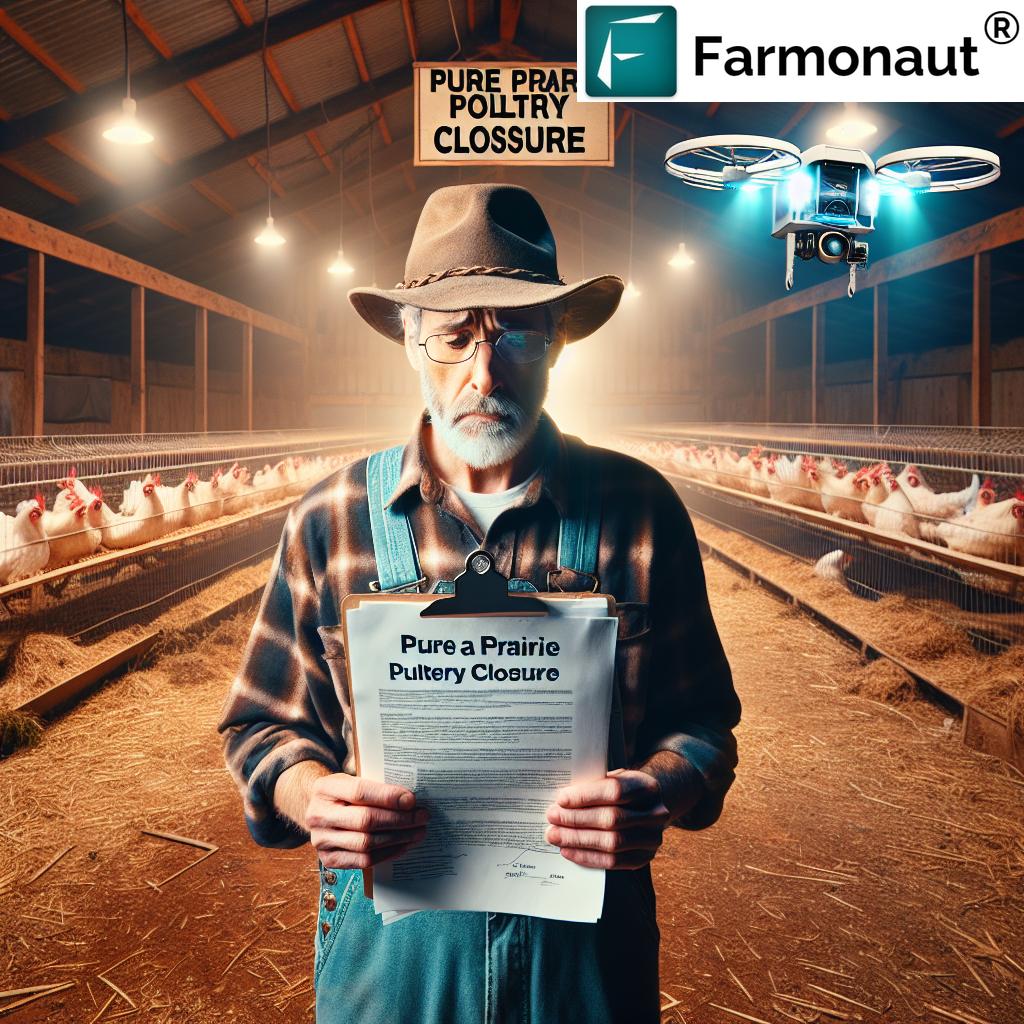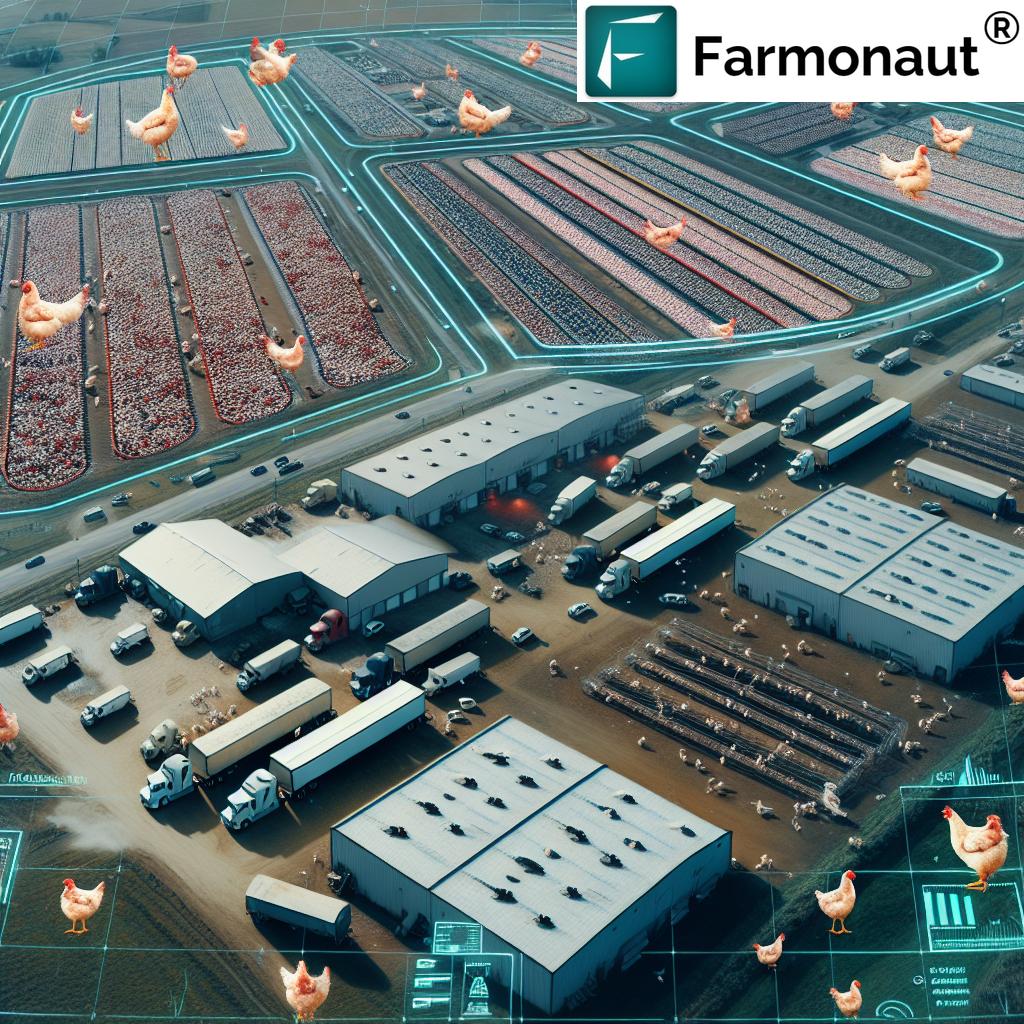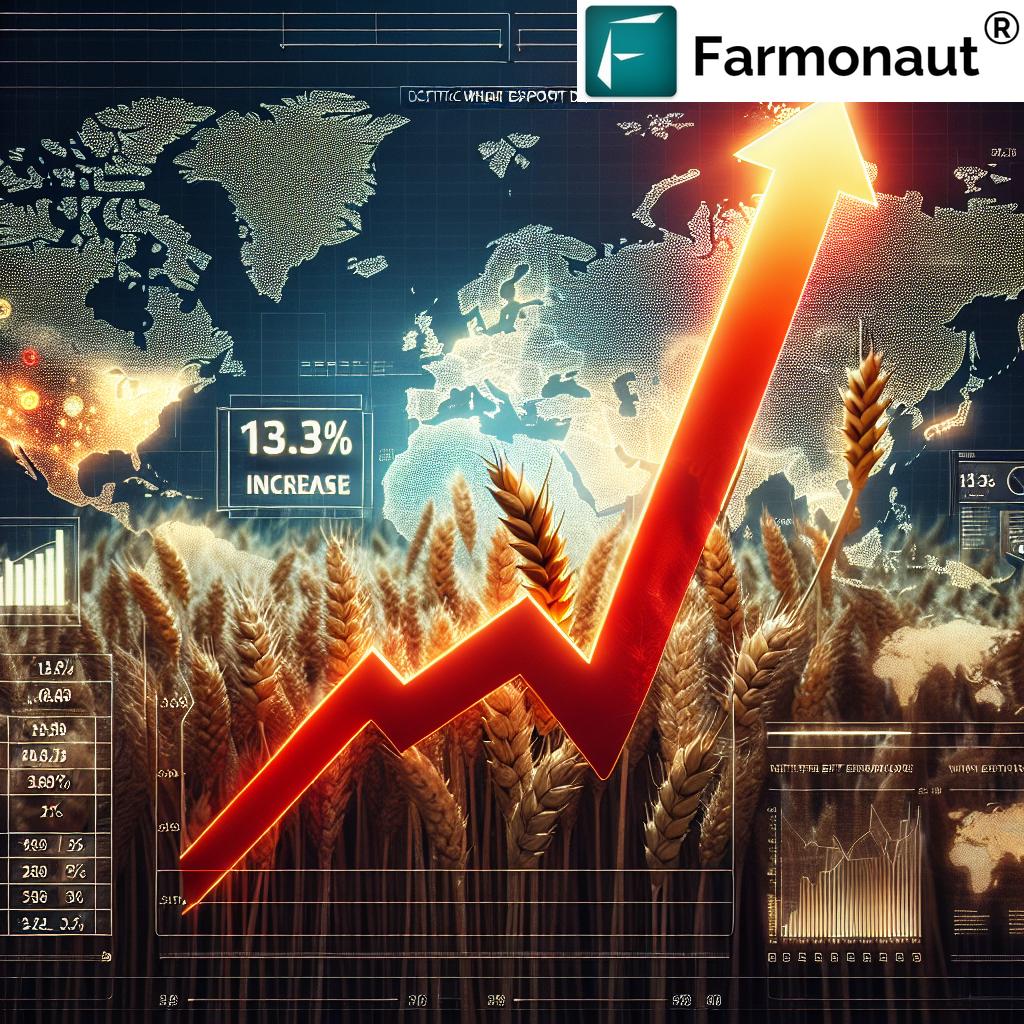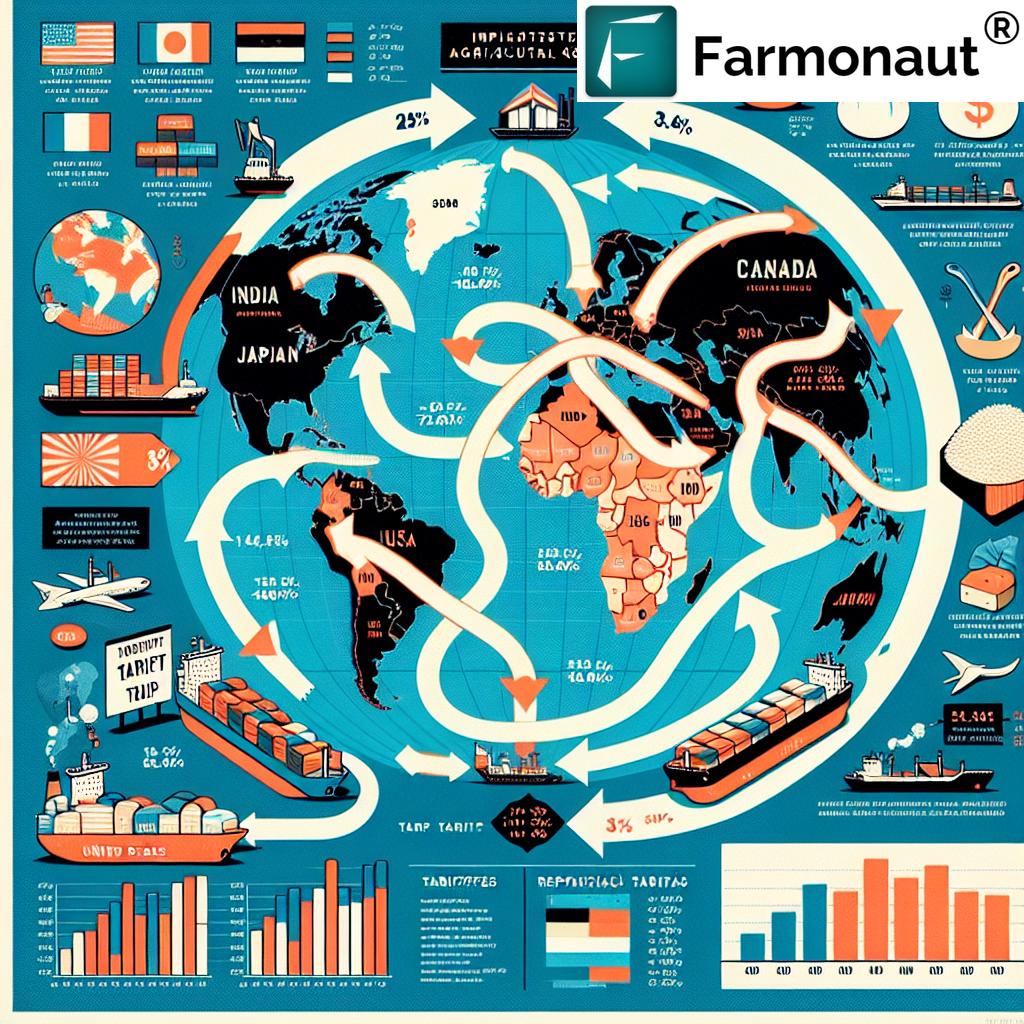Urgent: Midwest Organic Chicken Crisis Erupts as Processor Collapses – Farmers Face Catastrophic Animal Welfare and Financial Fallout
The Midwest organic chicken industry is reeling from a devastating blow as Pure Prairie Poultry, a major processor, abruptly closes its doors. This sudden collapse has triggered a cascading crisis for chicken farmers across Iowa, Minnesota, and Wisconsin, leaving them scrambling to find solutions for their flocks and finances.

The Unfolding Midwest Organic Chicken Crisis
The closure of Pure Prairie Poultry’s processing facility in Iowa has sent shockwaves through the Midwest poultry industry. This bankruptcy has not only disrupted poultry supply chains but also left farmers without essential resources to maintain their operations. The impact of the Pure Prairie Poultry bankruptcy is far-reaching, affecting thousands of farmers and millions of chickens across the region.
Key aspects of this crisis include:
- Disruption of poultry supply chains across Iowa, Minnesota, and Wisconsin
- Farmers left without processing facilities for their chickens
- An imminent animal welfare crisis with 1.3 million chickens at risk in Iowa alone
- Financial strain on organic chicken producers
- Increased risk of bird flu outbreaks due to overcrowding
As the situation unfolds, Farmonaut continues to monitor developments and provide valuable insights for affected organic chicken producers seeking financial aid and support during this challenging time.
The Domino Effect: Pure Prairie Poultry’s Closure
The sudden closure of Pure Prairie Poultry has created a domino effect throughout the Midwest organic chicken industry. This processor was a crucial link in the supply chain, handling a significant portion of organic chicken processing for the region. Without this vital facility, Midwest chicken farmers are left with nowhere to send their birds for processing, creating a bottleneck in the supply chain.
The impact of this closure is multifaceted:
- Farmers are unable to process their chickens, leading to overcrowding on farms
- The animal welfare crisis is escalating as chickens outgrow their intended market weight
- Financial losses are mounting for farmers who can’t sell their birds
- The organic chicken market is facing potential shortages
This crisis underscores the fragility of the poultry supply chain and the need for more robust systems to support farmers in times of unexpected disruptions.
USDA’s Role and Previous Support
Prior to this crisis, the USDA had provided $46 million in support to the industry. However, this substantial investment failed to prevent the collapse of Pure Prairie Poultry, raising serious questions about the effectiveness of USDA agricultural loans and support programs.
The failure of this support to avert the current crisis has led to calls for:
- A review of USDA loan and support mechanisms
- More targeted USDA aid for poultry farmers
- Development of emergency response plans for supply chain disruptions
- Increased oversight of poultry processors to prevent sudden closures
As the industry grapples with this crisis, it’s clear that more comprehensive and responsive support systems are needed to protect farmers and ensure the stability of the organic poultry sector.

Animal Welfare: A Looming Crisis
The most pressing concern arising from this situation is the imminent animal welfare crisis. With 1.3 million chickens at risk in Iowa alone, the scale of potential suffering is staggering. Overcrowding on farms leads to a host of problems:
- Increased stress on birds
- Higher risk of disease transmission
- Difficulty in maintaining proper sanitation
- Challenges in providing adequate food and water
The situation has brought animal welfare in chicken farming to the forefront of public attention. Farmers, already struggling financially, are now faced with the moral dilemma of how to care for their flocks humanely under these extraordinary circumstances.
State Governments Step In
Recognizing the severity of the situation, state governments across the Midwest are taking action to prevent a full-scale disaster. In Iowa, where the crisis is most acute, the state government is working on emergency measures to address the Iowa chicken farm emergency. These efforts include:
- Coordinating with other processing facilities to increase capacity
- Exploring temporary processing solutions
- Providing emergency financial support to affected farmers
- Working with animal welfare organizations to ensure humane treatment of chickens
Minnesota and Wisconsin are also mobilizing resources to support their poultry farmers and prevent the spread of the crisis across state lines.
Farmers’ Desperate Measures
In the face of this crisis, farmers are resorting to desperate measures to mitigate the impact on their flocks and livelihoods. In Minnesota, some poultry farmers are organizing giveaways, allowing people to come and collect chickens for free. While this helps reduce overcrowding, it’s far from a sustainable solution.
Other emergency measures being taken include:
- Seeking alternative processing facilities, often at great distances
- Implementing strict biosecurity measures to prevent disease outbreaks
- Exploring options for on-farm processing, where legally permissible
- Considering painful decisions like flock depopulation as a last resort
These actions highlight the desperate situation faced by Midwest chicken farmers and the need for immediate, coordinated support.
The Specter of Bird Flu
Compounding the crisis is the looming threat of bird flu. The overcrowding on farms significantly increases the Wisconsin bird flu risk, as well as in neighboring states. The potential for a bird flu outbreak in this already strained situation could be catastrophic, leading to:
- Mandatory culling of infected flocks
- Further disruption of the poultry supply chain
- Devastating economic losses for farmers
- Potential impacts on human health
Farmers and state agencies are on high alert, implementing stringent biosecurity measures to prevent the spread of disease. However, the current crisis makes these efforts more challenging than ever.
Call for Urgent USDA Action
In response to this escalating crisis, Senator Tammy Baldwin has called for urgent USDA action. The senator’s plea underscores the need for immediate federal intervention to address the Midwest poultry supply chain disruption and provide relief to affected farmers.
Key demands include:
- Emergency agricultural financial aid for affected farmers
- Assistance in finding alternative processing facilities
- Support for temporary processing solutions
- Review and reform of existing support programs to prevent future crises
The USDA’s response to this call for action will be crucial in determining the fate of many Midwest organic chicken producers.
The Role of Technology in Crisis Management
In these challenging times, technology can play a crucial role in helping farmers navigate the crisis. Farmonaut’s satellite-based farm monitoring system can assist organic chicken producers in optimizing their farm management practices, even under these stressful conditions.
Key benefits include:
- Real-time monitoring of farm conditions
- Early detection of potential health issues in flocks
- Optimization of resource allocation
- Data-driven decision making for farm management
Farmers can access these tools through the Farmonaut Android app or the iOS app.
Looking Ahead: The Future of Midwest Organic Chicken Farming
As the industry grapples with this crisis, it’s clear that significant changes are needed to ensure the long-term viability of organic chicken farming in the Midwest. Potential long-term solutions include:
- Diversification of processing facilities to reduce dependency on single operators
- Development of more robust emergency response plans
- Increased investment in local, smaller-scale processing facilities
- Enhanced support systems for farmers facing market disruptions
- Greater integration of technology in farm management and supply chain operations
The current crisis, while devastating, may serve as a catalyst for much-needed reforms in the industry.
Conclusion
The Midwest organic chicken crisis triggered by the Pure Prairie Poultry closure has exposed critical vulnerabilities in the poultry supply chain. As farmers face the dual challenges of animal welfare concerns and financial instability, the need for swift and effective action is clear.
While state and federal agencies work to address the immediate crisis, the industry must also look ahead to implement long-term solutions that will create a more resilient and sustainable organic chicken farming sector in the Midwest.
For farmers seeking support during this challenging time, resources like Farmonaut’s satellite monitoring API and developer documentation can provide valuable tools for optimizing farm management and weathering the storm.
As this situation continues to evolve, staying informed and leveraging available resources will be crucial for all stakeholders in the Midwest organic chicken industry.













